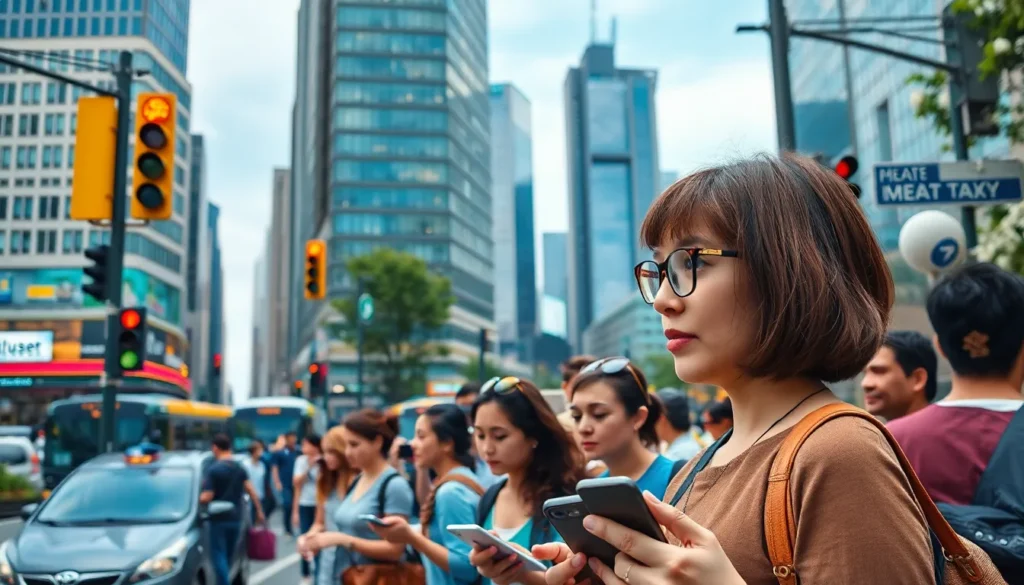Imagine a city where traffic jams are a thing of the past and your morning coffee is brewed by a friendly robot. Welcome to the world of smart city technologies, where innovation meets everyday life in ways that make even the Jetsons jealous. These cutting-edge solutions are transforming urban landscapes into efficient, sustainable havens that cater to the needs of their residents.
From intelligent traffic systems that know when to change the lights to waste management that practically cleans itself, smart cities are not just a futuristic dream; they’re here and thriving. As cities embrace these technologies, they’re not just upgrading infrastructure; they’re also enhancing the quality of life for everyone. So buckle up and get ready to explore how these innovations are reshaping urban living and making our cities smarter, one gadget at a time.
Table of Contents
ToggleOverview of Smart Cities Technologies
Smart city technologies encompass a variety of innovations aimed at enhancing urban living. These technologies streamline city operations, making them more efficient and sustainable. IoT devices, for example, facilitate real-time data collection, helping cities improve resource management.
Sensors deployed throughout urban environments gather critical information. Traffic monitoring systems track vehicle flow, allowing for better congestion management. Waste management technologies optimize collection routes, reducing operational costs and environmental impact.
Communication networks play a crucial role in smart cities. High-speed internet access ensures residents and businesses can connect seamlessly. Wireless networks support the deployment of various smart applications and increase accessibility for all.
Public transportation systems utilize smart technologies to enhance user experience. Real-time tracking apps inform commuters of bus or train schedules. Automated payment systems simplify fare collection, encouraging public transit use.
Energy-efficient solutions contribute significantly to sustainability. Smart grids monitor electricity usage and adapt supply according to demand. Solar panels and wind turbines power city infrastructure, reducing reliance on fossil fuels.
Data analytics informs decision-making processes within city governance. Analyzing urban trends enables officials to allocate resources effectively. Predictive modeling helps in planning for future needs and challenges.
Smart city technologies enhance environmental monitoring as well. Air quality sensors track pollution levels, enabling timely interventions. Green spaces are integrated into urban planning, promoting biodiversity and improving residents’ well-being.
Innovative technologies pave the way for a connected and efficient urban experience. Cities equipped with smart solutions improve quality of life while addressing challenges associated with rapid urbanization. Advanced technologies not only transform city landscapes but also foster collaboration among stakeholders, ensuring a holistic approach to urban development.
Key Technologies in Smart Cities

Smart city technologies significantly enhance urban environments. They incorporate various innovations that improve efficiency and the quality of life for residents.
Internet of Things (IoT)
IoT devices serve as the backbone of smart cities. These devices collect real-time data, facilitating optimal resource management. Traffic sensors monitor congestion and adjust signal timing accordingly. Waste management systems utilize IoT for effective route optimization, reducing operational costs. Smart meters track energy consumption, empowering residents to make informed decisions. Integration of IoT fosters seamless communication between devices, amplifying overall city efficiency.
Big Data and Analytics
Big data facilitates informed decision-making in smart cities. Data analytics provides insights into urban trends and resource usage. City planners utilize predictive analytics to foresee future needs, helping allocate resources effectively. Information gathered from sensors and user interactions enhances operational strategies. Analyzing historical data reveals patterns, allowing cities to respond proactively to challenges. Insights derived from data inform policies that promote sustainability and improve quality of life.
Artificial Intelligence (AI)
AI technologies play a vital role in optimizing urban services. They enhance traffic management by predicting congestion and suggesting alternative routes. Smart public transportation systems use AI for real-time tracking and optimal scheduling. Moreover, AI aids in predictive maintenance, identifying potential failures in infrastructure before they occur. In environmental management, AI algorithms analyze data from sensor networks to monitor air quality and pollution levels effectively. These AI-driven solutions lead to smarter, more efficient urban ecosystems.
Applications of Smart Cities Technologies
Smart city technologies significantly enhance urban living through various applications that promote efficiency and sustainability.
Transportation Management
Transportation management benefits from smart city technologies through the implementation of smart traffic lights and real-time monitoring systems. Traffic congestion decreases as sensors collect data to optimize traffic flows. Real-time navigation apps provide commuters with updated information about routes and delays. Public transport systems utilize smart technology for automated scheduling and tracking, boosting ridership rates. Successful integration of ride-sharing platforms with public transit encourages more individuals to utilize these services, helping to alleviate urban traffic challenges.
Energy Efficiency
Energy efficiency emerges as a key focus within smart cities, driven by smart grids and renewable energy sources. Smart meters allow residents to monitor energy usage and make informed decisions about conservation efforts. Solar panels increasingly power city infrastructures, reducing dependence on non-renewable resources. District heating systems optimize energy distribution, maximizing efficiency in buildings. Energy management systems ensure that street lighting adjusts according to ambient conditions, further minimizing waste.
Public Safety Enhancements
Public safety enhancements reflect the transformative impact of smart technologies on urban environments. Surveillance cameras equipped with advanced analytics enhance monitoring capabilities in public spaces. Emergency response systems leverage real-time data, allowing for quicker deployment of services during crises. Smart streetlights can increase visibility and alert authorities in case of unusual activities. Community engagement platforms enable residents to report concerns directly to city officials, fostering a collaborative approach to public safety. Effective use of these technologies ultimately creates safer urban environments for all residents.
Challenges in Implementing Smart Cities Technologies
Implementing smart city technologies comes with various challenges that cities must address for successful integration.
Data Privacy Concerns
Managing data privacy poses significant challenges for smart cities. Organizations collect vast amounts of personal information through IoT devices and sensors. Residents often worry about how their data will be used and stored. Data breaches can lead to unauthorized access and misuse of sensitive information. Regulations regarding data protection vary, complicating compliance efforts for cities. Engaging with the community by explaining data usage increases trust and transparency, essential for successful smart city initiatives.
Infrastructure Costs
Infrastructure costs present a major barrier to implementing smart city technologies. Cities must invest heavily in upgrading existing systems and integrating new technologies. Budget constraints often limit the extent of these upgrades. Funding sources may not always align, creating gaps in financial planning. Long-term maintenance costs add additional complexity to budgeting processes. Collaborating with public-private partnerships can offset some of these financial burdens, promoting sustainable development while navigating high initial costs.
Future Trends in Smart Cities Technologies
Emerging technologies are set to shape the future of smart cities. Advanced artificial intelligence applications provide city planners with valuable insights for decision-making. Enhanced machine learning algorithms analyze data patterns to optimize urban services and infrastructure utilization.
2D and 3D data visualization techniques simplify complex datasets, helping stakeholders grasp critical information quickly. Innovations in IoT devices expand connectivity options, enabling cities to gather data seamlessly from various sources. Increased deployment of edge computing reduces latency and enhances real-time processing capabilities in smart city environments.
Sustainable energy solutions grow more prevalent as cities focus on reducing their carbon footprints. Smart buildings equipped with energy management systems monitor and adjust energy consumption for efficiency. Mobility-as-a-Service (MaaS) platforms redefine transportation options, integrating public and private transport solutions for better accessibility.
The integration of Blockchain technology enhances transparency and security in data sharing across platforms. Improved collaboration among public and private sectors streamlines project implementation, addressing challenges faced in infrastructure upgrades. Citizen engagement approaches evolve through user-friendly applications, allowing residents to actively participate in urban governance.
Environmental monitoring technologies are evolving rapidly, aiding cities in identifying pollution sources and mitigating their impact. Advanced air quality sensors notify residents of hazardous conditions, promoting public health awareness. Smart landscaping techniques leverage data to maintain urban green spaces efficiently.
As cities invest in these technologies, addressing cybersecurity concerns remains essential to build trust with citizens. Developing robust frameworks ensures data privacy and integrity while maximizing the benefits of smart city innovations. Cities that adopt these emerging trends will likely foster vibrant, efficient, and inclusive urban environments for future generations.
Smart city technologies are reshaping urban landscapes and enhancing the quality of life for residents. By leveraging IoT devices AI and big data analytics cities can optimize resource management improve public safety and create sustainable environments.
As cities embrace these innovations they must also navigate challenges like data privacy and infrastructure costs. Building strong public-private partnerships will be crucial in overcoming these barriers and fostering inclusive urban development.
The future of smart cities looks promising with advancements in technology paving the way for more efficient and connected communities. As these trends continue to evolve cities can become more vibrant and resilient for generations to come.





